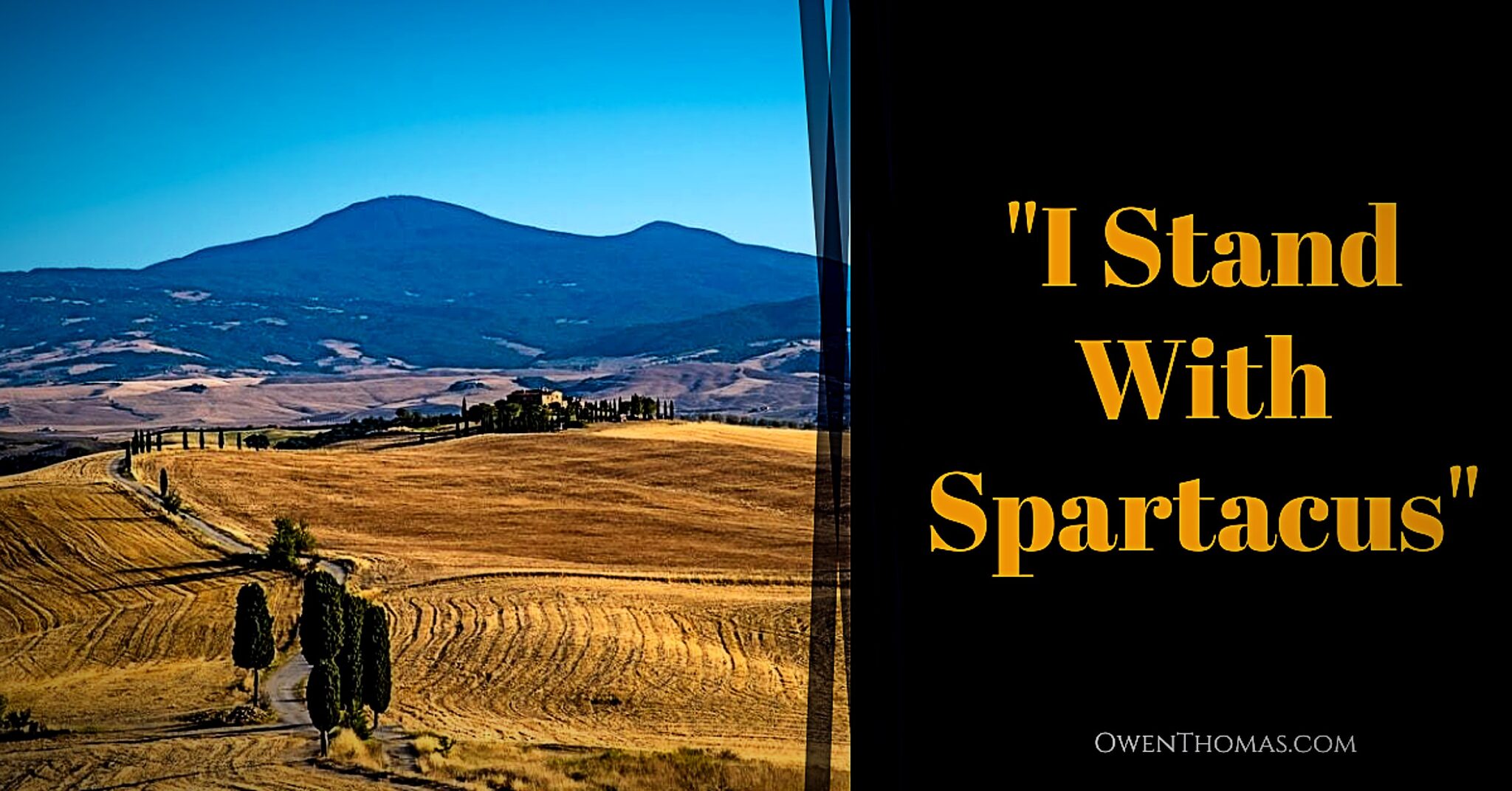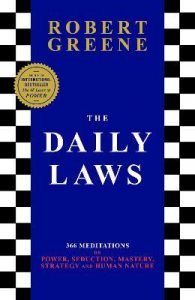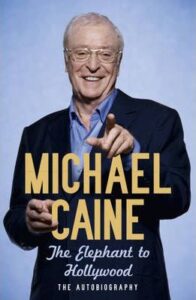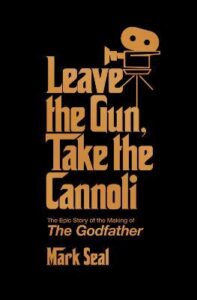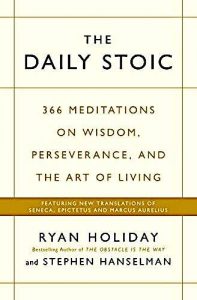“I didn’t do anything wrong — but— I didn’t do anything right either.”
In BC 73, a group of gladiators and several slaves, in total, around 70 people, plotted to escape and free themselves from the power of the Roman Republic. They used kitchen utensils and fought their way free, seizing several wagons of gladiatorial weapons and armour on the way. They elected three gladiators to be their leaders — Crixus, Oenomaus, and Spartacus.
They lead the Roman Armies in a merry dance for two years, with their numbers swelling over time to over seventy thousand. It wasn’t until the brutal, ambitious general and statesman, Marcus Crassus, volunteered to end the rebellion that Spartacus and his army were finally trapped in the heal of Italy and defeated in battle. Spartacus’ body was never found.
In the Stanley Kubrick film Spartacus, we see Crassus attempt a strategic move after the last battle — that if Spartacus, unknown in appearance, comes forward, he will spare the lives of the other six thousand survivors. There is a moment’s hesitation then, as Spartacus is about to stand, another man stands up beside Spartacus. As Spartacus declares — “I’m Spartacus”, he also proclaims no, he is “Spartacus”. Again, there is a pause, then, in deviance, another man stands and claims no — he is “Spartacus”, then another, then another, until all the remaining survivors claim that they too are “Spartacus.”
The first protest I went to was against the second Iraq war. I didn’t believe there was a good argument for it, but most importantly, I didn’t accept that Australia should be part of that war. I wasn’t the only one. The streets of Melbourne, my hometown, were jammed with over 300,000 people. At that time, the biggest rally and protest in the state capitals’ history. It was an image and demonstration that citizens repeated in every major town in Australia that day. I remember sitting on the train on the way into the city, and it seemed that everyone was heading in the same direction — a massive anti-war rally. We all believed that there was no good reason to go to war. As history has later shown, we were correct.
In the days leading up to that protest, I debated whether to go. In those days, my health was still poor and whilst my recovery was underway, it was slow, and it took constant attention and care. On the surface, I had every reason not to participate in the protest. I knew it would take a few days, possibly some weeks, for me to recover from the expenditure of energy. I would have to invest some extra money in health support to aid that recovery. I also knew that if we failed to persuade the government that Australia should not go to war, we would be asking many men and women to risk, and possibly lose their lives. My circumstances were insignificant to the loss of life.
I went to the protest willingly. I believe it is imperative to do what we can. It may not be very much. But all those little bits add up. If we all do what we can, who knows what could happen. I wasn’t able to be “Spartacus”. I didn’t have the strength, or wherewithal to start a movement or action, but I could stand with him.
The film Official Secrets, based on the book The Spy Who Tried to Stop a War, is the true story of whistle-blower GCHQ analyst Katherine Gun. Gun leaked a memo exposing an illegal spying operation by American and British intelligence services to gauge the sentiment of and potentially blackmail United Nations diplomats tasked with voting on a resolution regarding the 2003 invasion of Iraq. Her actions were violating the Official Secrets Act. Her goal was to prevent an illegal invasion, which she believed was a higher moral calling. There is a scene to avoid the ongoing suspicions of her colleagues Gun confesses and is led unceremoniously out of the office. In the aftermath, some of her colleagues admitted they felt the same as Katherine — but there was no “I’m Spartacus” moment. No one stood beside her; no one else risked their career and prison for a higher calling even though they too had read the same memo. Katherine is left to deal with the outcome on her own.
As I wrote about in The Stasi, Crabs & Cooked Frogs, and it bears repeating here, Jordan Peterson points out in his bestseller –“12 Rules For Life”– we like to think we would be the exception to the rule. The person who saves the Jewish neighbour from the horrors of the Nazis. The man or woman who would risk it all to escape from a terrifying regime. Or we would perhaps plan and scheme, hiding banned books and documents that disseminate another way of life. However, if we look at history, we, more than likely, would not be that person. We would more likely be the oppressors — We would accept the party line. We would not question, not look too deeply, not risk or upset the status quo. Particularly if there is a convincing narrative, a powerful explanation, and we have been sold a good story to explain the world in which we live. It is very demanding to live with the anxiety of being wrong. It is far easier to “believe” we must be right. It is easier to hand over our thinking to another power, whether a person, organisation or state.
This reality is why, if we witness someone’s courage to stand and hold to the moral fibre to be “Spartacus”, it is important to stand with them to declare that we too are “Spartacus”. It is not only as support for their position but to retard and perhaps stop our own moral decline. The stance for us is also a little easier as we are not alone in the standing — we already have “Spartacus” standing beside us. It is important to commit oneself as it makes it easier for the next “Spartacus” to find the courage to hold the line against an oppressor or an immoral action or position. We may fail in our attempt to change the outcome, but when we look back, it will not be with regret or self-disgust. We have done what we can.
“Life is a storm, my young friend. You will bask in the sunlight one moment, be shattered on the rocks the next. What makes you a man is what you do when that storm comes.” – Alexandre Dumas
We personally may not have the internal means to be “Spartacus”, that courage, emotional resources, opportunity, or indeed the true believer’s passion for starting an action or movement. Still, by the simple act of doing what we can by standing with the courageous, we enable them and ourselves.
These “I Stand with Spartacus” opportunities surround us all the time. The bully in the workplace. The wrong management decision. The alpha’s Saturday night attempt to have a friend stay one round too many. Lets us not fail to see them or act with whoever declares they are “Spartacus.”
“Every man is guilty of all the good he did not do…” – Voltaire
As the film “Dead Poets Society” closes, the sacked and disgraced teacher, Mr Keating, hung out to dry as the scapegoat by events of others making, makes one last entry into the classroom to collect his personal property. Here he finds the school head taking what was once his class on poetry in a tedious, passionless exploration of poetry that is anything but mundane.
As Keating departs, the boys on the verge of becoming young men are conflicted with their training and upbringing to be subservient to authority and feel powerless to stop what has happened. Finally, one young man, our “Spartacus”, if you will, stands on his desk, faces Keating, and calls out “Oh Captain My Captain”. The opening lines to a poem by Walt Whitman written in 1865 about the death of Abraham Lincoln. It reminds us of an earlier scene in the movie where Keating encouraged the boys to stand on their desks — to see the world with different eyes. That moment is powerful enough. However, the real power comes when, one by one, other boys also stand on their desks in honour of a man who changed their lives and opened new worlds to them. They, too, stood and said, “I Stand with Spartacus”. We know that their and our world will never entirely be the same.
“He who remains silent is deemed to have granted his consent — or so the old tenet goes. So will we remain silent, or will we speak up loud and clear and truthfully?” — Neil Oliver.
Last year in Brett’s Philosophy, I wrote about a throwaway line my friend often repeated when we were debating what course of action to take — “In a hundred years we’ll all be dead, and you’ll be lucky if anyone remembers our name.”
While this is true, (let’s face it, most of us struggle to remember our grandparents’ names, ) what will be remembered is what we stood for and the people with courage we stand beside. Because those values and ideals have ripples that extend far beyond our mere names, they build the worlds around us and the histories they leave behind.
When we see someone’s courage to stand alone against a wayward authority, let us summon whatever shaky courage we may possess and say that we too “Stand with Spartacus.” Let us do what we can. We may not be able to be a “Spartacus”, but we can stand with them.
And if life finds us in the fortunate position in our ending, to have friends and family send us off, may they, in the eulogy, perhaps paraphrase Edward Kennedy’s on the death of his brother Robert.
“This is the way he lived. My brother need not be idealised or enlarged in death beyond what he was in life, to be remembered simply as a good and decent man, who saw wrong and tried to right it, saw suffering and tried to heal it, saw war, and tried to stop it.
Don’t miss the next opportunity to take a stand with those courageous — To do what you can.
Till next time… something to think about and share.
Post Script: I’m aware that Marcus Licinius Crassus had the six thousand survivors crucified all along The Appian Way to Rome. There is no certain victory in any endeavour. But given death comes to us all, when you look back, do you want your life to be one of a cold timid soul knowing neither victory nor defeat?
Resources & Further Reading
12 Rules for Life – Jordan Peterson
The Stasi and the Berlin Wall | DW Documentary
Courage Is Calling : Fortune Favours the Brave – Ryan Holiday
The Spy Who Tried to Stop a War, – By Marcia Mitchell and Thomas Mitchell
